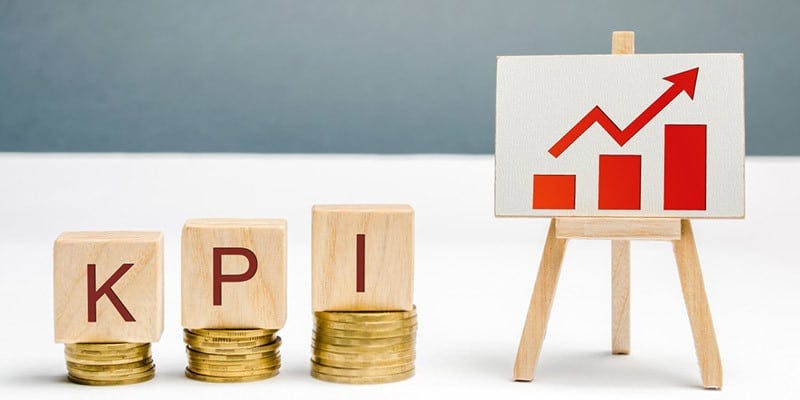Building KPIs: Everything You Need To Know
Professional Manual for Building KPIs
KPIs are critical to the long-term success of your work. It makes you focus on what's important and provides you with an easy way to understand whether or not you're making progress. But what exactly are the key performance indicators? And how do you use it?
This article will answer all your questions about building keys.
What is the meaning of KPI?
The concept of KPIs is an acronym for Key Performance Indicators in English. It is a value against which to measure the long-term progress of companies in achieving strategic goals.
key performance indicators KPIs assist the company in achieving its primary business objectives by analysing its core financial and operational objectives.
The value of key performance indicators and KPIs should be linked to the enterprise's strategic objectives. Key performance indicators identified vary by institution and must be designed to reflect the priorities and needs of each work.
Here we conclude that the function of KPIs is to help corporate management identify problems related to organisational processes and then create a strategy to solve the problem and implement it before it has a far-reaching negative impact on company performance.

What are the specifications for performance indicators?
What makes a good KPI measure of performance is a widespread one.
The answer is straightforward: The excellent performance index helps you make better decisions.
For example, suppose you work in the tourism and travel industry. In that case, your strategic goal is to provide entertainment and relaxation for your guests by offering a variety of activities and services. In this case, key performance indicators such as work rates can be used to measure how well you achieve this goal.
Another example is if you work in the oil and gas industry, your goal may be to extract oil reserves as efficiently as possible. In this case, you can use many KPIs such as average cost per barrel or real drums recovered daily.
The following are some of the critical specifications for key performance measures:
- A good measure provides clear factual information on the progress made towards your ultimate goals.
- Assists in making more substantive decisions.
- Key performance measures must be quantified.

What are the three most important KPIs?
Here are the three most important financial performance indicators that each small company must use to track its performance, in addition to knowing how successful it is:
Profit margin: It is one of the most important indicators used to assess the effectiveness of business success in organisations. The higher your profit margin, the better you do. If your profit margin is low or negative, this is a clear sign that your project needs to improve its operations and generate more profits.
Revenue growth rate: This measure shows the pace of growth of your work by comparing current-period income with previous-period income (month-to-month or annual). The revenue growth rate can explain whether your company is growing fast enough to justify expansion plans or attract investors or if it needs a change in strategies.
Working capital rate: To measure the company's liquidity and ability to meet short-term commitments, making it an important indicator of financial health. The ratio of health working capital indicates that your work has sufficient cash flow for day-to-day operations and other short-term expenditures—the assets traded against the liabilities traded and multiplied by 100% to calculate this ratio.

How do you ensure the success of the company's critical performance indicator plan?
To ensure the successful application of key performance indicators, each of the objectives of these indicators must be set in a SMART manner:
Selected: The targets must be specific. List the exact steps you need to achieve the goal.
Measurable: Find a specific way to measure data recorded through a set of measurable measures used to measure overall performance, which is essential in managing key performance indicators.
Achievable: Short-term goals must be easy to achieve. Achieving small successes is seen as helping to accelerate the achievement of long-term goals.
Related: The objectives of key KPIs performance indicators must be directly relevant to project objectives, thus positively impacting clients, managers, and staff.
Time-bound: A time frame and deadline have been established to achieve the main performance indicator targets. When targets are set for a certain period, your team can complete tasks on time.
Evaluation: Ensure that KPIs are evaluated daily, weekly, monthly, or annual. Regular and recurrent evaluations will increase the ability of the responsible team to achieve the objectives of key performance indicators.
Reassessment: The final step is to reset the approach applied to achieving KPIs targets on an ongoing basis so that the reassessment will lead to more remarkable progress and higher performance.

How are key performance indicators written?
The identification of the right key performance indicators depends on organisational objectives. For example, if you want to improve your website's search arrangement, the leading performance indicator may be the number of links to your website from other sites. Or, if you want to reduce expenditures and increase profits, the leading performance indicator may be income with fewer costs. But in general, you can rely on the following steps to write indicators KPIs:
- Start with the strategy.
- Identify the questions to be answered.
- Identification of company data requirements.
- Assess all existing data.
- Find the correct supporting information.
- Determine the correct measurement methodology.
- Ensure that the Project Task Force understands performance measurement indicators. Find the best way to achieve the goals of performance indicators.
- Audit of key performance indicators to measure their effectiveness in improving performance.
In conclusion,
Key performance indicators KPIs have become commonly used tools that give companies an idea of how much they have achieved over time. By monitoring key performance indicators, you can develop your strategy accordingly.
If your key performance indicators do not meet expectations or if you find yourself behind schedule or unable to expand, this may be a sign that you need to reconsider your strategy.
We hope this article will help you deblur key performance indicators and provide a professional business model to make key performance indicators work effectively in your company.
If you're a business manager and want to feed your team's experience with managerial and leadership skills, we advise you to attend business management training courses in London.